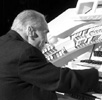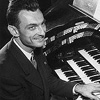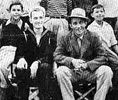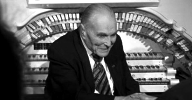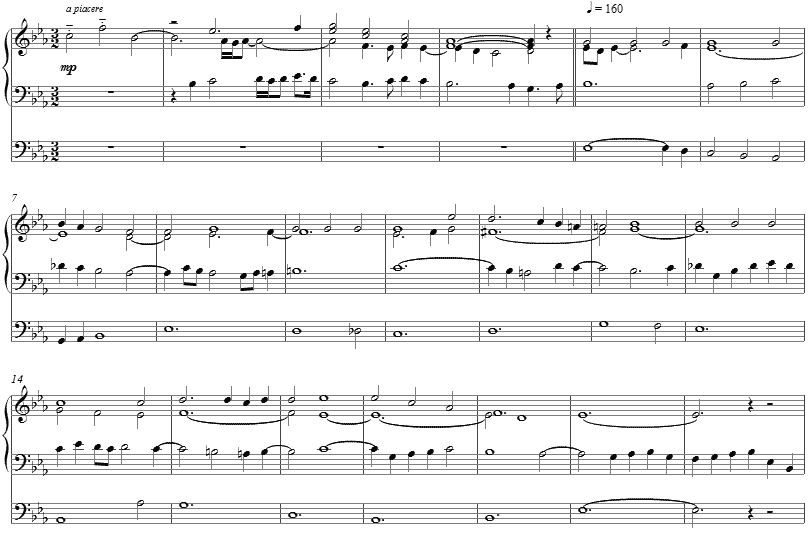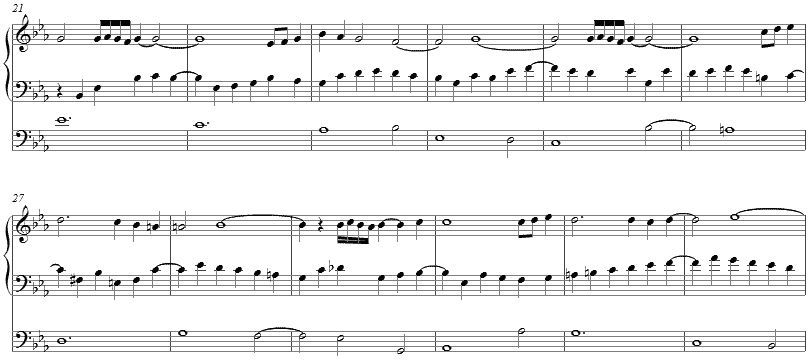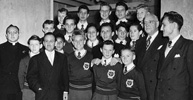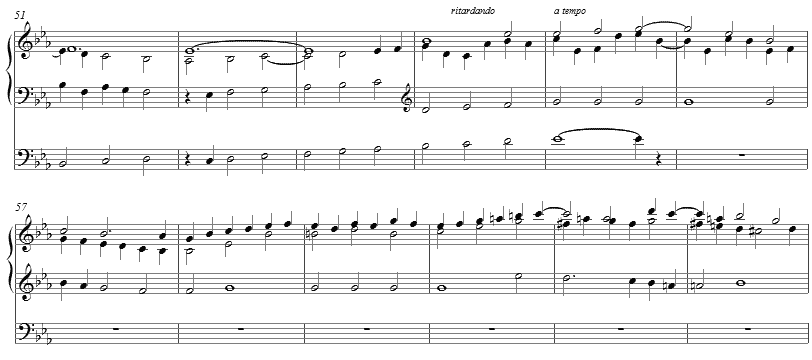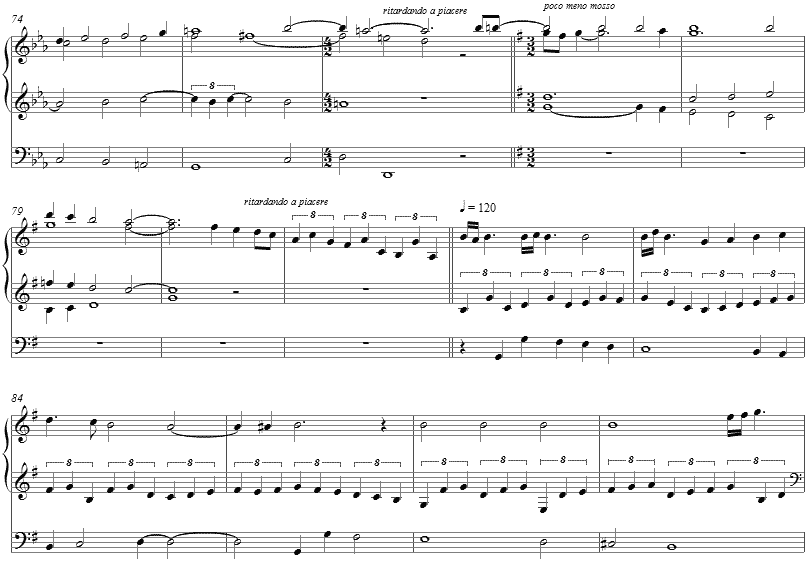Music and Texts of GARY BACHLUND
Vocal Music | Piano | Organ | Chamber Music | Orchestral | Articles and Commentary | Poems and Stories | Miscellany | FAQs
Chorale Variations on "Cloisters" - (2008)
for organ
for my friend, Robert Mitchell
Bob Mitchell at the Orpheum
After enjoying a still vital and intellectually acute Bob Mitchell accompany a silent film while in his nineties, my brother and I drove him home. On the way, we stopped for a late dinner in Los Angeles, and during conversation Bob told me his favorite hymn tune, "Cloisters," was by British composer, Joseph Barnby [ 1 ]. I had worked many times with Bob over the years, providing music for a number of churches and synagogues. During my tenure as Cantor at Ahavat Shalom, he played many services for me, to include improvising fine accompaniments to spontaneous cantorial improvisation. Additionally we would sometimes do classical works during masses at Good Shepherd, in Beverly Hills. For these reasons, I thought it would be quite right to compose this set of variations in honor of Bob -- Mr. Mitchell as many of his "boys" still call him.
Bob Mitchell in the heyday of Hollywood
Born October 12, 1912, Bob Mitchell showed an acute aptitude for music early on. In 1924, at the age of twelve, Bob started playing organ accompaniment to silent films, beginning a passion for silent cinema music that would last a lifetime. In 1932 in Rochester, New York, he studied at the Eastman School of Music on a piano scholarship. In 1933, he moved to New York City where he continued his study with a scholarship at the New York College of Music, was substitute organist in churches, played piano and sang on radio WNYC and did nightly stints at Joe's Chateau, a popular speakeasy in Manhattan to supplement his income. Moving to Los Angeles, he started the Mitchell Singing Boys (also known as the St. Brendan's Church Choir or Bob Mitchell's Singing Boys, from 1934-2000), which went on to perform in scores and on screen in more than one hundred films, including 1944's Best Picture winner Going My Way (1944) with Bing Crosby. [ 2 ]
Bob Mitchell with Bing Crosby
Academy Award winning composer Dimitri Tiomkin said, “Bob Mitchell’s boys represent the unusual combination of musicianship, artistry and versatility. Bob Mitchell’s genius is ever present. It was a great pleasure to have them sing and appear in The Great Waltz." Honors have included a Silver Medal personally awarded at the Royal Palace in Monte Carlo by Prince Ranier and Princess Grace of Monaco; a Silver Beaver Medal, the highest honor awarded scoutmasters by the Boy Scouts of America; acclamation as a Knight of Malta with a medal from the American Melkite Archimandrate; an Honorary Plaque in the Amphitheater of Temple Ahavat Shalom, Northridge, California; and the "Pro Papa et Ecclesia" Certificate from Pope John-Paul the Second.
Receiving applause after accompanying the silent movie. Wings (1927), of 2 hours and 24 minutes
Given Bob's affection for the hymn by Barnby, the hymn tune is stated clearly in the soprano voice after a short introduction, with a slightly more ornate accompaniment than the hymn tune itself.
The theme is then accompanied by a running counterpoint in the tenor voice, with some ornamentation of the melody line. A following variation changes the voice leading in subtle ways, the melody remaining in the soprano voice.
Mitchell Singing Boys, at the Hollywood Bowl in 1947. Click on image to enlarge.
A following variation places the hymn tune as the lower voice in a set of "treble" voices at measure 55. This reflects and honors Bob's long work with treble voices, and seemed an apt texture to add to the variations of the hymn tune. A number of his film music arrangements for the choir were in close harmony for which the boys were renown in their heyday.
An episodic modulation from E flat to G major prepares for the final variation, in which the duple rhythm of the hymn tune in accompanied by a running triple rhythm and "walking" bass line. A light finishing "touch" is the repeated A-sharp in the cadence, reflecting not only the lower neighbor ornamentation in this variation but also with a nod to Bob's sense of humor. [ 3 ]
The entire work is here,
, an MP3 file [ 4.15 MB, 4' 30" ]
With Bob in his ninety-fifth year.
The score for Chorale Variations on "Cloisters" is available as a free PDF download, though any major commercial performance or recording of the work is prohibited without prior arrangement with the composer. Click on the graphic below for this organ score.
Chorale Variations on "Cloisters"
NOTES
[ 1 ] Joseph Barnby (1838-1896) entered the choir of York Minster at age seven, and precociously became organist and choirmaster at twelve. In 1854 he went to London and entered the Royal Academy of Music, where he studied with Potter and Lucas. He served as organist at Mitcham, St. Michael’s, Queenhithe, and St. James’ the Less, Westminster, before he was
appointed to St. Andrew’s, Wells Street, where he remained from 1863 to 1871, establishing the musical reputation of the services.
From 1871 to 1886 he was organist of St. Anne’s, Soho, where he instituted the annual performances of Bach’s Passion according to St. John, with orchestral accompaniment. In 1867, the Novellos, to whom he had been musical adviser since 1861, established "Barnby’s Choir," which gave oratorio concerts from 1869 to 1872, when it was amalgamated with the choir formed and conducted by Charles Gounod at the Albert Hall, under the title of the Royal Albert Hall Choral Society, now the Royal Choral Society. Barnby conducted the St. Matthew Passion in Westminster Abbey in 1871, and was appointed precentor of Eton in 1875, a post he kept until 1892, when he succeeded Thomas Weist-Hill as principal of the Guildhall School of Music.
In 1878, Barnby helped found the London Musical Society, becoming its first director and conductor. Under his baton, the Society produced Dvorak’s Stabat Mater for the first time in England, and in 1884, conducted the first performance in England of Wagner’s Parsifal as a concert in the Albert Hall. He was knighted in 1892, and in the same year conducted the Cardiff Festival. Barnby’s compositions include an oratorio, Rebekah, 1870, The Lord Is King, 1893, an large number of services and anthems, part songs and a series of Eton Songs, 246 hymn tunes (published in one volume in 1897), and edited five hymnals, the most important of which was The Hymnary (1872).
[ 2 ] Among other films in which the Mitchell Singing Boys appeared are: College Swing (1937) The Hunchback of Notre Dame (1939), Meet John Doe (1940), Penny Serenade (1940), Yankee Doodle Dandy (1942), The Jolson Story (1945), Duel in the Sun (1946), The Bishop's Wife (1947), Peter Pan (1953), White Christmas (1954), Giant (1956), Robin and the Seven Hoods (1964), The Agony and the Ecstasy (1965), and so many more.
[ 3 ] When I took up opera professionally and went to Europe, Bob remained at Ahavat Shalom at a time when the congregation was changing greatly. He was responsible in his seventies to work with our volunteer choir as well as a whole new staff in the months prior to the High Holy Days. I had written him from Glasgow to inquire how he was getting along with so many changes. I received a letter in care of the Scottish Opera written on letterhead stationery from a fictional law firm with offices on Fairfax Drive in Los Angeles. The humorous text read:
October 10, 1986
Our client Mr. Bob Mitchell was so moved by your letter to him from Glasgow Scotland that he instructed us (against our advice) to drop his contemplated suit against you for the physical, mental and emotional torture he has experienced as a result of your leaving him with a choir of forty people and a new Cantor and Rabbi, numerous selections beyond their capabilities without your guidance and the complete deliberate and apparently malicious obscuration of the copies of the familiar and practical selections.
He has asked us not to mention to you the several hundreds of dollars of printing due to your callous neglect and indifference not the fact that it took him and three employees many hours after Midnight on numerous evenings to rearrange eighty folders, thus causing great conflict with his ever increasing professional engagements.
An unresolved question in our client's mind has greatly upset Mr. Ken Remo. If you are playing Escamillo all is well. If however it is Don Jose, this will inflict an irreversible mental breakdown upon him which may still result in the instigation of legal action against you.
Yours very truly,
John O'Brien
Legal Secretary
Silverman, Ginsberg, Goldstein & Cohen
